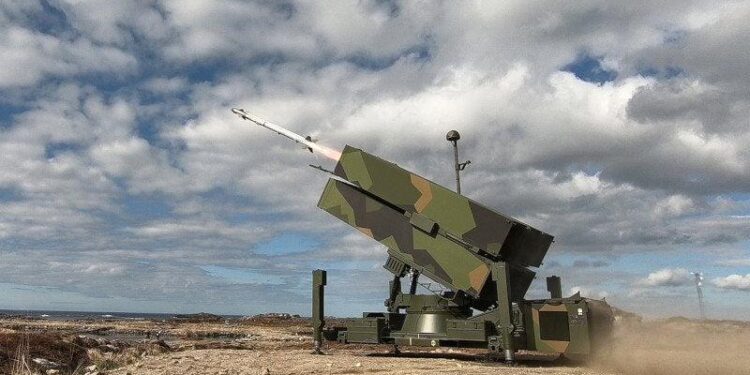Belgium and Luxembourg have announced plans to jointly procure the NASAMS (Norwegian Advanced Surface to Air Missile System) air defense system in collaboration with the Netherlands, marking a significant step toward bolstering regional security. This trilateral initiative aims to enhance the three countries’ integrated air defense capabilities amid growing strategic challenges in Europe. The coordinated acquisition underscores a commitment to closer military cooperation within the Benelux alliance and reflects a broader trend of European nations modernizing their defense infrastructure.
Belgium and Luxembourg Strengthen Air Defense Collaboration with Netherlands Through NASAMS Acquisition
In a significant move to bolster regional air defense capabilities, Belgium and Luxembourg are joining forces with the Netherlands to pursue the acquisition of the advanced NASAMS (Norwegian Advanced Surface to Air Missile System). This collaboration aims to create a more unified and resilient aerial defense network within the Benelux region, reducing reliance on external allies and enhancing response times against emerging aerial threats. The joint procurement is expected to streamline maintenance, training, and operational procedures across the three countries, fostering greater interoperability and cost-efficiency.
Key benefits anticipated from this trilateral initiative include:
- Enhanced coverage of critical airspace with overlapping missile system ranges.
- Shared technological upgrades to keep pace with evolving threats.
- Coordinated command and control infrastructure for rapid threat detection and engagement.
- Optimized logistics support through joint acquisition and spare parts management.
| Country | Estimated NASAMS Units | Role |
|---|---|---|
| Belgium | 6 | Airspace coverage & defense |
| Luxembourg | 2 | Support & command integration |
| Netherlands | 8 | Primary operational deployment |
Strategic Implications of the Joint NASAMS Purchase for Regional Security in Western Europe
The collaborative acquisition of the NASAMS air defense system by Belgium, Luxembourg, and the Netherlands marks a significant evolution in Western Europe’s collective security framework. By pooling financial and operational resources, these nations are set to bolster their integrated air defense capabilities against a range of aerial threats, from missile attacks to unmanned drones. This joint endeavor will enhance interoperability within NATO’s regional framework, ensuring a coordinated and rapid response in crisis scenarios. Moreover, it reflects a strategic commitment to shared defense priorities amid growing geopolitical tensions near Europe’s borders.
Key strategic benefits include:
- Increased missile interception range, improving coverage across critical urban and military zones
- Streamlined cross-border communication through shared command and control centers
- Cost efficiency via joint training programs and centralized maintenance
- Strengthened deterrence by presenting a unified defense posture to potential adversaries
| Country | Projected Deployment Year | Estimated Units | |||||||||||||||||||
|---|---|---|---|---|---|---|---|---|---|---|---|---|---|---|---|---|---|---|---|---|---|
| Belgium | 2025 | 4 | |||||||||||||||||||
| Luxembourg | 2026 | 2 | |||||||||||||||||||
| Netherlands | 2024 |
| Country | Projected Deployment Year | Estimated Units |
|---|---|---|
| Belgium | 2025 | 4 |
| Luxembourg | 2026 | 2 |
| Netherlands | 2024 | 5 |
If you want, I can help you with formatting, summary, analysis, or anything else related to this content!
Recommendations for Enhancing Multinational Coordination and Integration of NASAMS Systems
To maximize the effectiveness of NASAMS across Belgium, Luxembourg, and the Netherlands, fostering seamless interoperability must take precedence. This includes the development of unified communication protocols and a shared real-time data link infrastructure, which would allow each nation’s units to operate as a cohesive air defense network. Additionally, investment in joint training exercises that simulate realistic threat scenarios will significantly enhance command cohesion and rapid response capabilities among participating forces.
Key focus areas for improved coordination should include:
- Standardized maintenance and logistics support to streamline system readiness and reduce downtime.
- Integrated command and control centers to consolidate threat assessment and decision-making processes.
- Collaborative research and development initiatives, promoting technology upgrades and cost-sharing benefits.
| Coordination Aspect | Expected Benefit |
|---|---|
| Joint Training Programs | Enhanced tactical coordination and readiness |
| Unified Data Sharing | Faster threat identification and neutralization |
| Shared Logistics | Optimized resource allocation and reduced costs |
Final Thoughts
The planned joint acquisition of NASAMS air defense systems by Belgium, Luxembourg, and the Netherlands underscores a growing trend of regional cooperation in enhancing military capabilities. By pooling resources and aligning strategic priorities, these neighboring countries aim to bolster their collective security in an increasingly complex geopolitical environment. As the procurement process moves forward, the collaboration may serve as a model for future defense partnerships within Europe, reflecting a shared commitment to maintaining robust and interoperable defense infrastructures.
















